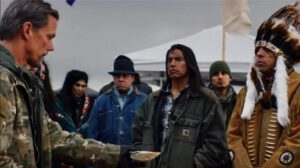Movie Info
Movie Info
- Director
- Josh and Rebecca Harrell Tickell
- Run Time
- 1 hour and 26 minutes
- Rating
- Not Rated
VP Content Ratings
- Violence
- 2/10
- Language
- 2/10
- Sex & Nudity
- 1/10
- Star Rating
Relevant Quotes
The wicked accept a concealed bribe to pervert the ways of justice.
know that the Lord maintains the cause of the needy and executes justice for the poor.
Psalm 140:12know that the Lord maintains the cause of the needy and executes justice for the poor.

Co-writers/directors Josh and Rebecca Harrell Tickell (along with co-writer William Mapother) have given us a social justice visual parable dealing with the environment as well as the mistreatment of indigenous Americans. Although the journalist hero is fictional, his story centering on the Dakota Access Pipeline is not—and how the ongoing struggle over it concludes should be of concern for every American who is concerned for the earth and for justice for all.
Daniel McKinney (William Mapother) is an Afghan War veteran still suffering from flashbacks of the injuries he suffered overseas. He is eking out a living as a freelance journalist in Ohio when he accepts an assignment from Houston Daily Ricky (Francis Fisher), editor of the fictional Houston Daily to write an article about the contentious Dakota Access Pipeline that runs through the Standing Rock Indian Reservation in North Dakota. Even though his pregnant wife Julie (Amy Smart) badly wants him to stay with her, the birth due soon, he agrees to go because they need the money. He is expected to write a pro oil company piece that will help in the nation-wide debate over the controversial project. The editor knows that he is a Republican, deeply in debt, and expecting a child, so more than likely to support the project.
Flying out in a private plane with oil company executive Elliot (David Arquette) Daniel is told, “I connect people. I help people. The pipeline company is my client, but right now my job is to help you tell the best story you can.” That latter part means, of course, a piece favorable to the oil company. And there are good arguments—the oil from the pipeline would move our nation away from depending on foreign suppliers. Also the pipeline is providing many jobs to Americans–one of the first persons he interviews is one of the workers, who inflates his story with the claim that the protestors have shot at them with bows and arrows.
Daniel, while trying to maintain minimal contact with his wife, writes his story, and it is all that the oil company could ask for. The editor likes Daniel’s piece so much that she hires him to return to Standing Rock and to talk with the protestors so he can show how their disruptive tactics are threatening the well-being of America. But there are disturbing sights that bother him–of bulldozers ripping up the land and of angry protestors trying to block the machines. As he seeks to enter the ranks of the protestors he does not reveal that is the author of the Houston Daily article. He speaks with Terry (David Midthunder) who is more accepting of the outsider than
The somewhat skeptical Mika (Kerry Knuppe) warms to him, though Mary Singing Crow (Irene Bedard) looks upon him with contempt. He quickly learns that the attacks by bows and arrows is merely expressions of racist stereotypes, and that the land through which the pipeline is being thrust is both sacred land and the source of the Nations’ drinking water. Daniel discovers the truth of the first when he finds an arrowhead, and it is determined to be of ancient origin. What happens when his new friends discover the truth about him leads to a potentially explosive confrontation. And, too, there is his tense relationship with his about to give birth wife who resents his return to Standing Rock even more than the first time.
The film has been criticized as one more “white savior” tale, and in truth it is. There is vastly more time given in the film’s relatively short running time to the fictional character’s woes than there is to the far more weightier ones of the Native Americans’. It is a tribute to the fine acting of the Native American cast that they stand out as well s they do, but the film would have been far more effective had they been front and center—we already have Dances With Wolves and Schindler’s List as redemptive tales of men who come to the aid of minorities. Or, if the filmmakers had kept the current plot, another half hour of scenes revealing more of the experiences of the First Nation characters would have greatly improved the film.
Despite the above caveats, Josh and Rebecca Harrell Tickell have thus far been the only filmmakers to make a dramatic film dealing with the Dakota Access Pipeline, which as the film end notes point out is by no means settled yet. Those concerned about the despoiling of the environment and still another incident of the trampling on the rights of Indigenous people will want to catch this film. Currently showing only in limited release, mainly at art house theaters. If not offered in your area, you can already rent or buy it on Amazon Prime.
This review will be in the February issue of VP along with a set of questions for reflection and/or discussion. If you have found reviews on this site helpful, please consider purchasing a subscription or individual issue in The Store.

